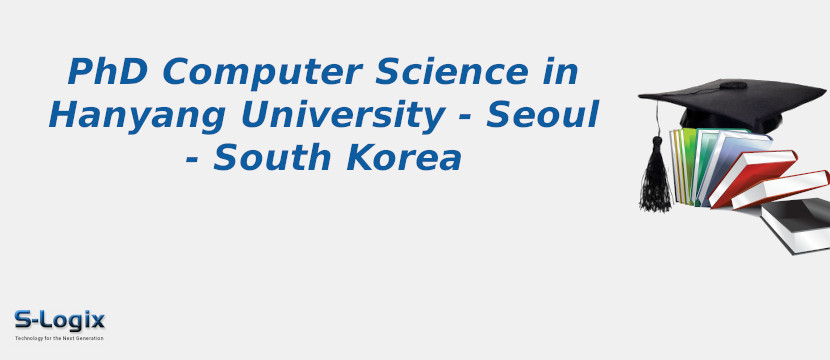Hanyang University is a top-ranked institution in Seoul, South Korea, founded in 1939. Hanyang University is an all-inclusive research university with a long history of academic greatness and engagement in advancing research and education.
Hanyang University is composed of 16 colleges and 13 professional graduate schools. Hanyang University is popular for its research-oriented environment, with an emphasis on fostering creativity and academic excellence. Its excellent academic record has a wide range of research areas, such as engineering, biomedicine, life sciences, social sciences, humanities, and business.
Hanyang University also delivers a broad range of opportunities for students to engage in research through its number of research centers and labs, research grants, and scholarships.
Address: 222 Wangsimni-ro, Seongdong-gu, Seoul, South Korea
Phone: +82 2-2220-0114
Email: intladms@hanyang.ac.kr
Website: https://www.hanyang.ac.kr/web/eng
Undergraduate Courses:
• Computer Science
• Computer Science and Engineering
• Computer Science and Business Administration
• Computer Science and Mathematics
• Computer Science and Electrical Engineering
Graduate Courses:
• Computer Science
• Computer Science and Engineering
• Computer Science and Business Administration
• Computer Science and Mathematics
• Computer Science and Electrical Engineering
• Computer Systems Engineering
• Computer Network Engineering
• Artificial Intelligence
• Data Science
Ph.D. Courses:
• Computer Science
• Computer Science and Engineering
• Computer Science and Business Administration
• Computer Science and Mathematics
• Computer Systems Engineering
• Computer Network Engineering
• Artificial Intelligence
• Data Science
Hanyang University has been at the forefront of computer science research implementing innovative solutions to some of the world-s most pressing technological challenges.
• Computer Systems
• Database and Knowledge Engineering
• Network and Security
• Artificial Intelligence and Intelligent Systems
• Image Processing and Virtual Reality
• Applied Computing (Bioinformatics and HCI)
• Computational Theory
Computer Systems;
• Hardware-software co-design
• Low-power computing
• Real-time computing
• Embedded software engineering
• Embedded storage systems
• Embedded operating systems
• Embedded computer architecture
• Embedded databases
Database and Knowledge Engineering;
• Big data exploiting statistics
• Artificial intelligence or machine learning techniques
• High-end computing platforms with cutting-edge multicores
• Flash-based non-volatile storage
• Data mining
Network and Security;
• Internet protocols
• Mobile networks
• Multimedia communications
• Service quality Assurance (QoS)
• Mobility supported protocols
• Next-generation network structures
• IoT / RFID / ITS (Intelligent Transportation System) / P2P networking
• System Security
• Software security
• Vulnerability analysis
• Malicious code analysis
• Network security
• Web and mobile security
Artificial Intelligence and Intelligent Systems;
• Visual perception
• 3D reconstruction of environments for autonomous driving and robot navigation
• Machine intelligence based on ontology
• Intelligent information retrieval and collaborative recommendation
• SNS text mining
• Smart learning
• Semantic web
• Biological data mining
Image Processing and Virtual Reality;
• Computer graphics
• Computer vision
• Computer Vision and Machine Learning Lab
• Network Security Lab
• Embedded System Lab
• Artificial Intelligence Lab
• High Performance Computing Lab
• Robotics Lab
• Software Engineering Lab
• Algorithm Analysis and Design Lab
• Human-Computer Interaction Lab
• Computer Graphics Lab
• Computer Architecture Lab
• Computer Network Lab
• Human Intelligence Technology Lab
• Human-Machine Interaction Lab
• Natural Language Processing Lab
• Information Retrieval Lab
• Software Design Lab
• Wireless Network and Mobile Computing Lab
• Computer Engineering Education Center
• Information Security Center
• Robotics Research Center
• Computer Systems Group
• Database and Knowledge Engineering Group
• Network and Security Group
• Artificial Intelligence and Intelligent Systems Group
• Image Processing and Virtual Reality Group
• Applied Computing (Bioinformatics and HCI) Group
• Computational Theory Group
• Hanyang Global Scholarship Program
• Hanyang Scholarship for International Students
• Hanyang Research Fellowship for International Students
• Hanyang Distinguished International Students Scholarship Program
• Hanyang Presidential Fellowship Program
• Hanyang University Graduate Scholarship Program
• Hanyang University Global Ph.D. Scholarship Program
• Korea Government Scholarship Program (KGSP)
• Korea Research Fellowship Program (KRF)
• National Research Foundation of Korea (NRF) International Fellowship Program
Funded projects in computer science at Hanyang University - Seoul - South Korea
• Development of an Intelligent System for Autonomous Driving
• A Study on the Application of Blockchain Technology for Smart City
• Development of a Deep Learning-Based Handwriting Recognition System
• A Study on the Development of a Highly Efficient Computer Vision-Based Object Detection System
• A Study on the Application of Artificial Intelligence in Smart Manufacturing
Applicants must submit the following documents via the online application system:
• Completed application form
• Statement of purpose
• Official academic transcripts
• Two letters of recommendation
• English proficiency test scores (TOEFL/IELTS)
• Copy of applicant-s passport
• Applicants must earn a bachelor-s degree or equivalent from an authorized institution with an excellent academic record
• Hanyang University-s admission committee will review the application documents to assess the eligibility of the applicant.
